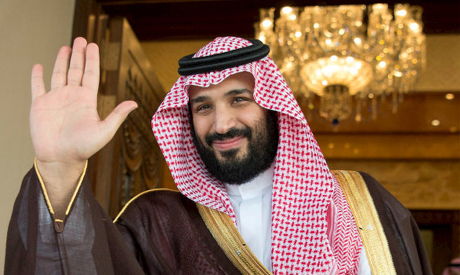
FILE PHOTO: Saudi Deputy Crown Prince Mohammed bin Salman waves as he meets with Philippine President Rodrigo Duterte in Riyadh, Saudi Arabia, April 11, 2017. (Reuters)
Saudi Arabia's King Salman made his son next in line to the throne on Wednesday, handing the 31-year-old sweeping powers as the kingdom seeks radical overhaul of its oil-dependent economy and faces mounting tensions with regional rival Iran.
A royal decree appointed Mohammed bin Salman crown prince and deputy prime minister. He retains the defence, oil and other portfolios.
The previous crown prince, Mohammed bin Nayef, the king's nephew and a counter-terrorism chief admired in Washington for putting down an al Qaeda campaign of bombings in 2003-06, was relieved of all his posts, according to the decree.
The royal decree said the decision by King Salman to promote his son and consolidate his power was endorsed by 31 out of 34 members of the Allegiance Council, made up of senior members of the ruling Al Saud family.
Saudi television was quick to show that the change in succession was amicable and supported by the family, intent on dispelling speculation of internal divisions in the ruling dynasty.
Throughout the early morning it aired footage of Mohammed bin Nayef pledging allegiance to the younger Mohammed bin Salman, who knelt and kissed his cousin's hand.
"I am content," Prince Mohammed bin Nayef said. Prince Mohammed bin Salman replied: "We will not give up taking your guidance and advice."
Analysts said the change ends uncertainty over succession and empowers Prince Mohammed bin Salman to move faster with his plan to reduce the kingdom's dependence on oil, which includes the partial privatisation of state oil company Aramco.
"The change is a huge boost to the economic reform programme... Prince Mohammed bin Salman (MbS) is its architect," said John Sfakianakis, director of the Gulf Research Centre.
After Prince Mohammed's promotion was announced, Saudi Arabia's stock market surged more than 3 percent in early trade.
Arab leaders, including Oman’s Sultan Qaboos, Jordan’s King Abdullah, Egypt's Abdel Fattah al-Sisi and Yemeni President Abd-Rabbu Mansour Hadi congratulated Prince Mohammed bin Salman on his appointment, according to state media.
The royal decree did not nominate a new deputy crown prince. The position is relatively new in Saudi Arabia, where kings have traditionally chosen their own successors.
In an apparent attempt to appease the family, the decree had a clause that made clear that Mohammed bin Salman won’t be allowed to appoint one of his own sons as his successor.
As deputy crown prince, Mohammed bin Salman has been responsible for running Saudi Arabia's war in Yemen, dictating an energy policy with global implications and spearheading plans for the kingdom to build an economic future after oil.
Financial analysts said Prince Mohammed's promotion gave further assurance that key parts of radical reforms to diversify the Saudi economy beyond oil would continue.
"We do not expect to see any major changes to key areas of policy, including economic," said Monica Malik, chief economist at Abu Dhabi Commercial Bank.
Last year Mohammed bin Salman, or "MBS" as he is widely known, announced sweeping changes aimed at ending the kingdom's reliance on oil, part of his campaign to tackle systemic challenges that the kingdom has previously failed to address.
POWER BEHIND THE THRONE
Prince Mohammed also heads the Council for Economic and Development Affairs (CEDA), a group of cabinet ministers who meet weekly and which oversees all elements of policy touching on the economy or social issues like education, health and housing.
Prince Mohammed chairs the supreme board of Aramco, making him the first member of the ruling family to directly oversee the state oil company, long regarded as the preserve of commoner technocrats.
Outside Saudi Arabia, that rapid advance and the sudden changes to longstanding policies on regional affairs, energy and its economy have prompted unease, adding an unpredictable edge to a kingdom that allies long regarded as a known quantity.
Inside, they have prompted admiration among many younger Saudis who regard his ascent as evidence that their generation is taking a central place in running a country whose patriarchal traditions have for decades made power the province of the old.
Saudi Arabia's main stock index was 3.4 percent higher. National Commercial Bank, the biggest listed lender, which is expected to play a major role in funding some of the non-oil industries Prince Mohammed bin Salman aims to develop, jumped 10 percent.
*This story has been edited by Ahram Online
Short link: